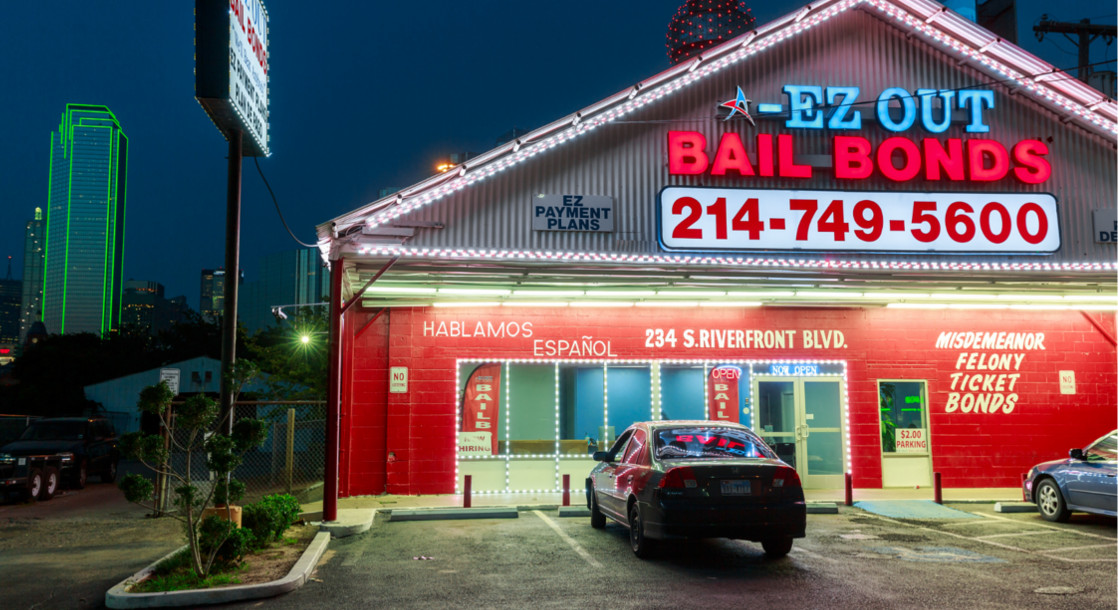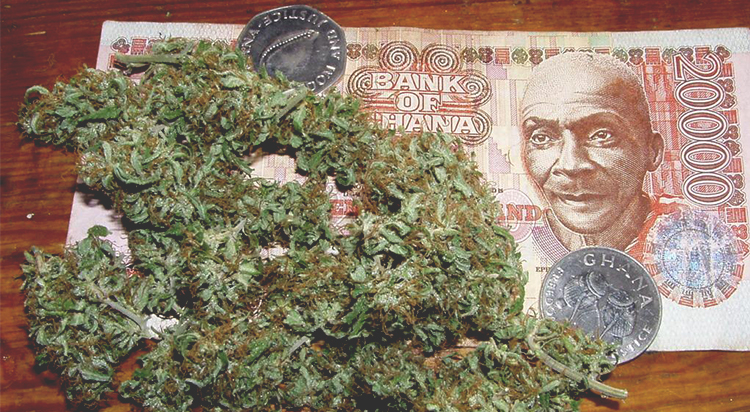EZ Out Bail Bonds in downtown Dallas, Texas; photo via Skyhobo
In 2007, the Texas legislature passed a "cite and release" policy for certain low-level crimes, including marijuana possession. The policy, however, didn't become statewide law at the time — instead, individual jurisdictions have had the choice of implementing it piecemeal at their own pace.
The point of the law is to enable police officers to simply write a citation for acts including cannabis possession, rather than arrest people on the spot for petty misdemeanors. "It wasn't a mandatory provision, it was intended to give cities and counties an option in terms of how they spend their enforcement dollars," explains Dallas city council member Philip Kingston. And it was trying to save save jail space.
Only since this past December has the city of Dallas adopted the policy — and yet it's done little to alleviate racially disproportionate policing. Every single one of the 23 citations for marijuana possession were given to blacks or Latinos, and all but six of the citations came from south of the Interstate 30, where there's a concentration of poor neighborhoods. "The law was specifically designed to imprison poor people of color," says Kingston. "We have a situation where poor people are disproportionately people of color, and poor people have a disproportionately high number of contacts with the police."
People in middle-class neighborhoods have very little contact with law enforcement, he says, but if you're from a lower-income demographic and without a car, for instance, you're out in the open and more vulnerable to police interactions.
While the law wasn't explicitly intended to address racial disparities in policing, Kingston hoped for de facto decriminalization of small amounts of marijuana, or anything under four ounces. "Possession [of small amounts] should be ignored by law enforcement because it has a disparate impact on minorities, and is a huge waste of police resources," he says.
Dallas is also facing a police shortage, according to Judge Nancy Mulder, who presides over the cite and release magistration process. "Weed is still illegal," she says. "[The cite and release policy] has created a lot of confusion for people because they think when you hear the word 'citation,' it means a ticket. This is a very poorly worded law; they should have used the word 'notice' or 'requirement to appear in court.'" It's just a way to allow marijuana possession offenders to not have to be arrested on the spot and be bailed out later; still, all 23 of the currently cited individuals are required to appear in court on February 21st.
"We don't get enough funding for criminal justice," says Mulder. "What should happen is that when a person is released on personal recognizance, they should [be assigned] a pretrial release officer if they don't show up in court, who can call the [individual] and tell them to show up."
What happens is that 60 percent of the people who get released from jail on a PR (personal recognisance) bond, which is absolutely free, don't show up to court later on. Then, there's a warrant issued for their arrest for failing to appear in court, and then when they get arrested again, they're left sitting in jail — wasting space and resources on account of low-level, nonviolent weed crimes.
While the state only pays for 40 percent of the probation department's budget, the rest is covered by probation fees imposed on the defendant, explains Mulder. "So you have a whole cycle that's making the poorest people in our community pay for the criminal justice system that has prosecuted them," she says. "That's from bonds all the way through to when you get probation."
About half of all defendants can't afford the probation fees, so instead, they'll take a plea deal, she adds. "Because they can't afford probation, they just take a conviction. With a possession of marijuana conviction, they can't get a better job, or certain educational grants from the federal government, or their driver's license gets suspended for six months. So this entire system has the effect of keeping poor people, who are also people of color in many places, poor."
It starts with the cash bond, but it's the whole system, she says. "Cite and release is a way to alleviate the effects of arrest and incarceration on nonviolent offenders," Mulder concludes. "We need our politicians to raise taxes so that we can create a criminal justice system that truly helps people, and cite and release is a step in that direction."
In Dallas, cite and release is a "good first step" in getting smarter about how to deal with marijuana possession cases, but it's still not enough, echoes Adriana Pinon, senior staff attorney at the ACLU of Texas. "It might alleviate some front-end issues that come with an arrest, so that people aren't held in jail and don't have to pay bond, but they're still facing criminal penalties, fines, and jail time," she says. Texas was second in the nation with its rate of marijuana possession arrests, Pinon adds, and the state is only seeing a progression of racially biased law enforcement.
Nonetheless, the last legislative session saw 11 separate marijuana-related bills, says Pinon, and candidates for local office are running on decriminalization platforms. There's momentum and will to change the law — but the system needs to go through massive reform before anyone reaps the benefits of potential policy reform.











